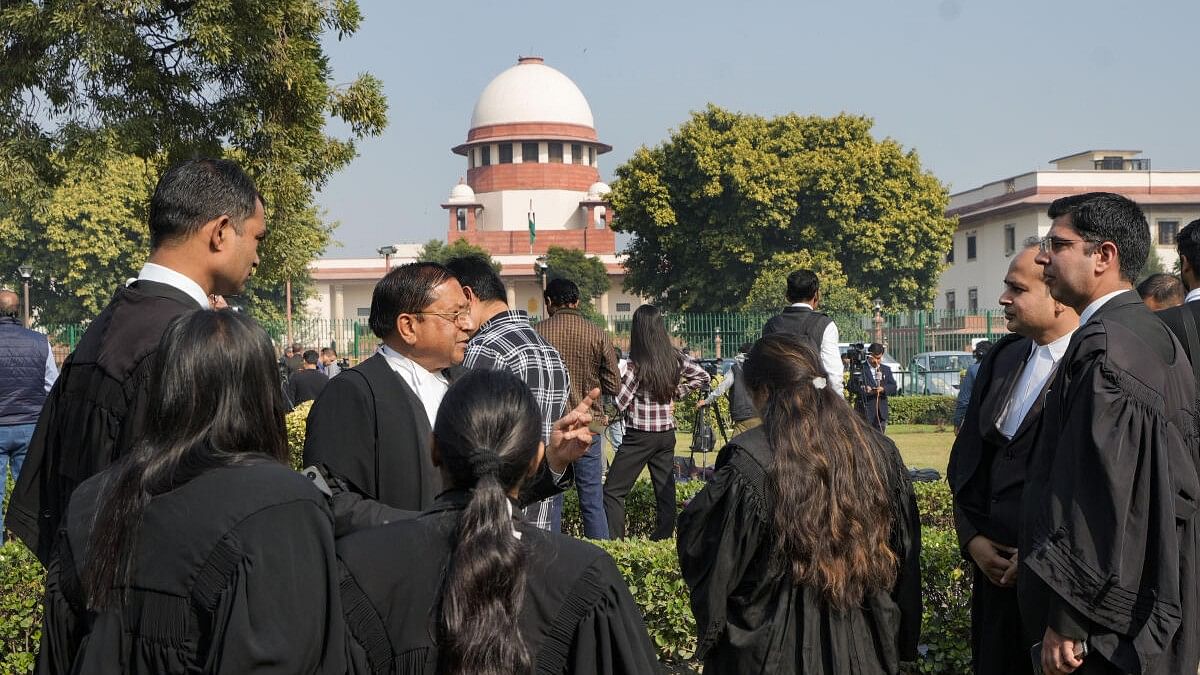
Lawyers at the Supreme Court complex, on the day of the court's verdict on a batch of petitions challenging the abrogation of Article 370 of the Constitution, in New Delhi.
Credit: PTI Photo
New Delhi: In a major judgment, the Supreme Court on Monday ratified the Union government's decision of August 5-6, 2019 to abrogate Article 370 of the Constitution taking away special status to bordering state of Jammu and Kashmir as legal and valid.
The bold and historic move by the central government was questioned for ignoring the will of the people of the erstwhile state.
However, a five-judge Constitution bench led by Chief Justice of India by its unanimous decision declared that the State of Jammu and Kashmir does not retain any element of sovereignty after the execution of the Instrument of Accession and the issuance of the proclamation on November 25, 1949 by which the Constitution of India was adopted.
The lead judgement authored by the CJI along with Justices B R Gavai and Surya Kant (two future CJIs) said the State of Jammu and Kashmir does not have ‘internal sovereignty’ which is distinguishable from the powers and privileges enjoyed by other States in the country.
"Article 370 was a feature of asymmetric federalism and not sovereignty," it said.
The court, thus, held the Constitution of India is a complete code for constitutional governance and would be fully applicable in the J&K.
"Following the application of the Constitution of India in its entirety to the State of Jammu and Kashmir by Constitutional order of 273, the Constitution of the State of Jammu and Kashmir is inoperative and is declared to have become redundant," the bench said.
With regard to reorganisation the state, the bench noted Solicitor General Tushar Mehta stated that the statehood of Jammu and Kashmir will be restored, except for the carving out of the Union Territory of Ladakh).
"In view of the statement, we do not find it necessary to determine whether the reorganisation of the State of Jammu and Kashmir into two Union Territories of Ladakh and Jammu and Kashmir is permissible under Article 3 of the Constitution. However, we uphold the validity of the decision to carve out the Union Territory of Ladakh in view of Article 3(a) read with Explanation I which permits forming a Union Territory by separation of a territory from any State," the bench said.
The court, however, directed the Election Commission to take steps to conduct elections to the Legislative Assembly of Jammu and Kashmir constituted under Section 14 of the Reorganisation Act by September 30, 2024.
"Restoration of statehood shall take place at the earliest and as soon as possible," it ordered.
Justice Sanjay Kishan Kaul, the second senior most, who is set to retire on December 25, said a combination of factors, such as Article 370’s historical context, its text, and its subsequent practice, indicate that Article 370 was intended to be a temporary provision.
"Article 370(3) contained the mechanism to bring the temporary arrangement to an end, and in turn, to de-recognise the internal sovereignty of the State and apply the Constitution of India in toto," he said.
The power of the President under Article 370(3) was unaffected by the dissolution of the Constituent Assembly of Jammu and Kashmir. The President could exercise their power anytime after the dissolution of the Constituent Assembly of Jammu and Kashmir, in line with the aim of full integration of the State. Hence, Constitutional Order 273, which declares that Article 370 shall cease to operate except as provided, and was issued under Article 370(3), is valid," he said.
Justice Sanjiv Khanna authored his separate and concurring judgment.
